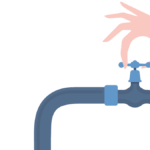The water shortage in California is a major problem that could affect residents for years. California drought had a serious impact on its economy and its people’s life. Here, we take a look at how bad it is, and how you can help if you live in California.

How the water shortage will impact California
How bad is the water shortage in California? The water shortage is a major concern for many people. The state is currently experiencing the worst drought in its history and climate change has only exacerbated the situation. Some experts say that this could result in an economic crisis as well. The national parks in California are also suffering because of the drought. Some of the sites have already closed and others could be closed soon.
The situation has also affected the many people that work at these parks. The National Park Service, which is part of the Department of Interior, will have to close at least 20 sites, including Yosemite National Park. The NPS says that it could close more sites in California if the situation continues to worsen.
What are the causes of the shortage?
California is in the midst of a water shortage due to a variety of factors. The primary causes of this shortage are extreme drought and rising temperatures. California was already facing a water conservation challenge because of its low rainfall levels, but with warmer temperatures, snowpack levels have been declining drastically. California has been suffering from a very long drought, one that started in the late 1970s and early 1980s.
From there, the drought has gotten progressively worse, with some areas of the state experiencing several years without rain at all. Agriculture is suffering in California during the worst drought in 1,200 years. Farmers are facing a water shortage in California and having to cut back on their crops and cattle as a result. The lack of rain, combined with humans continuing to use unsustainable methods of water consumption such as irrigating with greywater, using potable water to fill swimming pools, and mismanagement of the state’s water supplies has led to severe water shortage.
This shortage is impacting California’s economy, climate change, and agricultural industry as well as endangering the wildlife that lives in the state.
Solutions for the Drought
In the summer of 2017, California experienced the worst drought in recent memory. The water shortage has been so severe that farmers have had to sell their cattle and crops are turning brown. Many people have been affected by this as well, including farmers who rely on irrigation systems for their crops.
Scientists and government officials have proposed different solutions for this drought. The federal government has set out a plan to build the first wall of water, which will run the border of California. It will be approximately 1,600 miles long and will run alongside the United States-Mexico border. The wall will be made of plastic sheets that can be inflated by the flow of water.
The wall will become large enough for people to walk on it and the pressure of water will prevent the flow of water from flowing over the top. In the face of a nearly unprecedented water shortage in California, other solutions have been proposed to address the issue. One proposal, to use underground pumps as a barrier around the state, has recently been approved.
However, these solutions have not been implemented due to high cost and potential problems that could arise from connecting pipes with the previous border wall.
What are your thoughts on this?
California is especially facing a water shortage. California may be in a state of emergency due to the drought, but there is more than one cause. Presently, California has fallen short of its water supply and is looking for solutions to get back on track. In 2014 there were some water conservation measures were implemented in the state. Drought is definitely a problem in California.
Conclusion
California is experiencing a water shortage that threatens its food supply. A recent study found that nearly half of the state’s groundwater reserves are at risk of running out by 2060. As a result, many farmers have been forced to stop growing crops, which causes a drought-like effect in the state. Water shortages can lead to bankruptcies and job loss, as well as increased pollution due to landfills and other wastewater disposal methods that rely on groundwater.





